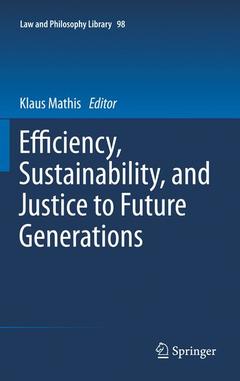Efficiency, Sustainability, and Justice to Future Generations, 2012 Law and Philosophy Library Series, Vol. 98
Coordonnateur : Mathis Klaus

A key requirement of sustainable development is justice to future generations. It is still a matter of fact that the law as well as the theories of justice are generally restricted to the resolution of conflicts between contemporaries and between people living in the same country. This in turn raises a number of questions: what is the philosophical justification for intergenerational justice? What bearing does sustainability have on the efficiency principle? How do we put a policy of sustainability into practice, and what is the role of the law in doing so?
The present volume is devoted to these questions. In Part One, ?Law and Economics?, the role of economic analysis and efficiency in law is examined more closely. Part Two, ?Law and Sustainability?, engages with the themes of sustainable development and justice to future generations. Finally, Part Three, ?Law, Economics and Sustainability?, addresses the interrelationships between the different aspects.
Date de parution : 11-2013
Ouvrage de 240 p.
15.5x23.5 cm
Date de parution : 08-2011
Ouvrage de 240 p.
15.5x23.5 cm
Thèmes d’Efficiency, Sustainability, and Justice to Future... :
Mots-clés :
Adam Smith's Invisible Hand Grows Green Fingers; Climate Change; Consequences of Human Action upon Nature; Cost-Benefit Analysis; Discounting and Sustainable Development; Economical; Social and Ecological Discussions of Sustainability; Economics for the Environment; Ensuring Justice for Future Generations; Environment as a Tradable Commodity; Environmental Commodities; Environmental Ethics; Global Climate Policy Debate; Legal Pluralism and Globalization; Principles of Coase's Bargaining Solution; Requirements of Sustainable Development; Social Distributive Justice; Solving Environmental Problems; Status Quo Theory; Sustainable Development; The Efficiency Principle; The Kyoto Protocol; Tradable Emissions Allowances; Trade in Emissions; Transnational Climate Protection; United Nations Conference on Environment and Development; Unleashing Environmental Destruction; Value of Social Projects; Weak Versus Strong Sustainability; World Commission on Environment and Development; World Summit for Sustainable Development


